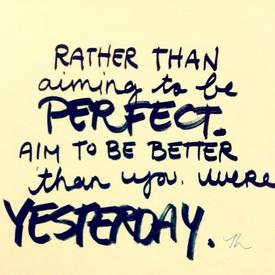GIRLS - maybe TMI question - gym fatigue and PMS?

allywilkes
Posts: 19 Member
Over the last few days I've noticed workouts becoming a LOT harder - my muscles feel tired and it's a real effort putting one step in front of another. I tire faster and feel like I'm working a lot harder for the "usual" amount of exercise.
I was wondering if hormonal changes during the menstrual cycle might be affecting me? I've only started exercising in the last couple of months, and this is the first time it's happened (I use hormonal contraception which limits the number of cycles I have, and this is the first cycle since starting gym-going).
Does this happen to anyone else?
I was wondering if hormonal changes during the menstrual cycle might be affecting me? I've only started exercising in the last couple of months, and this is the first time it's happened (I use hormonal contraception which limits the number of cycles I have, and this is the first cycle since starting gym-going).
Does this happen to anyone else?
0
Replies
-
Yep. Some push until they pass out. I lighten my eating and don't exercise. It makes me cramp unmercifully. Every body's different but this is my philosophy.0
-
It really effected me at first, but I've noticed the more time goes by the better I feel...Also I take extra b12 vitamin(you can buy at walmart) every morning with my other vitamins. Mostly just be patient.0
-
More water while working out maybe.
I've noticed a difference in my workout when it's that TOM but I do two things that make a BIG difference in the way I feel (1) I start taking a low dose asprin a few days before I start. I think this helps with my aches and pains. and (2) I increase my water. Chewing a sugarfee gum helps me feel more hydrated too (I don't know why but I feel better when I do).
I wish you the best.
Eva0 -
Are you getting a day of rest between the hard workouts. If not it could be your body telling you to rest.0
-
Yeah, I fatigue much easier while I'm PMSing. I do what Bootzey does and go easy on the calories I consume so I don't have to work out as hard.0
-
Ohhhh ya. My motivation during that special time is SHOT, my appetite turns ravenous, and I tend to gain a few lbs from water retention. I push through and work out anyway, but fatigue and muscle weakness stops me from being able to give it my all! Exercise anyway. It will improve your mood and make you feel much better!
 0
0 -
Oh yeah! Up your lean protine and keep your diet as clean as you can manage. Know thy self. Do what you can and try to be understanding of the stress your body is under. I have a mirena and experience this as well. At first I was a bit perplexed but after a while my workout fatigue became one of the ways that I knew that I was going to have a period and I just adjusted my expectations. Keep at it!0
-
Definitely it affects me. I tend to get lighter in the workouts and, well, do eat more. It's kind of an up and down thing but I don't like the thought of being so tired that I injure myself.0
-
I get this way towards the last few days of my workouts per week. You probably need to rest more. I notice the day after my rest days I tend to have WAY more energy than when I workout 3 days in a row.
Here is a good article on why you should make sure you have these rest days:
http://sportsmedicine.about.com/od/sampleworkouts/a/RestandRecovery.htm
Most athletes know that getting enough rest after exercise is essential to high-level performance, but many still over train and feel guilty when they take a day off. The body repairs and strengthens itself in the time between workouts, and continuous training can actually weaken the strongest athletes.
Rest days are critical to sports performance for a variety of reasons. Some are physiological and some are psychological. Rest is physically necessary so that the muscles can repair, rebuild and strengthen. For recreational athletes, building in rest days can help maintain a better balance between home, work and fitness goals.
In the worst-case scenario, too few rest and recovery days can lead to overtraining syndrome - a difficult condition to recover from.
What Happens During Recovery?
Building recovery time into any training program is important because this is the time that the body adapts to the stress of exercise and the real training effect takes place. Recovery also allows the body to replenish energy stores and repair damaged tissues. Exercise or any other physical work causes changes in the body such as muscle tissue breakdown and the depletion of energy stores (muscle glycogen) as well as fluid loss.
Recovery time allows these stores to be replenished and allows tissue repair to occur. Without sufficient time to repair and replenish, the body will continue to breakdown from intensive exercise. Symptoms of overtraining often occur from a lack of recovery time. Signs of overtraining include a feeling of general malaise, staleness, depression, decreased sports performance and increased risk of injury, among others.
Short and Long-Term Recovery
Keep in mind that there are two categories of recovery. There is immediate (short-term) recovery from a particularly intense training session or event, and there is the long-term recovery that needs to be build into a year-round training schedule. Both are important for optimal sports performance.
Short-term recovery, sometimes called active recovery occurs in the hours immediately after intense exercise. Active recovery refers to engaging in low-intensity exercise after workouts during both the cool-down phase immediately after a hard effort or workout as well as during the days following the workout. Both types of active recovery are linked to performance benefits.
Another major focus of recovery immediately following exercise has to do with replenishing energy stores and fluids lost during exercise and optimizing protein synthesis (the process of increasing the protein content of muscle cells, preventing muscle breakdown and increasing muscle size) by eating the right foods in the post-exercise meal.
This is also the time for soft tissue (muscles, tendons, ligaments) repair and the removal of chemicals that build up as a result of cell activity during exercise.
Long-term recovery techniques refer to those that are built in to a seasonal training program. Most well-designed training schedules will include recovery days and or weeks that are built into an annual training schedule. This is also the reason athletes and coaches change their training program throughout the year, add crosstraining, modify workouts types, and make changes in intensity, time, distance and all the other training variables.
Adaptation to Exercise
The Principle of Adaptation states that when we undergo the stress of physical exercise, our body adapts and becomes more efficient. It’s just like learning any new skill; at first it’s difficult, but over time it becomes second-nature. Once you adapt to a given stress, you require additional stress to continue to make progress.
There are limits to how much stress the body can tolerate before it breaks down and risks injury. Doing too much work too quickly will result in injury or muscle damage, but doing too little, too slowly will not result in any improvement. This is why personal trainers set up specific training programs that increase time and intensity at a planned rate and allow rest days throughout the program.
Sleep Deprivation Can Hinder Sports Performance
In general, one or two nights of poor or little sleep won't have much impact on performance, but consistently getting inadequate sleep can result in subtle changes in hormone levels, particularly those related to stress, muscle recovery and mood. While no one completely understands the complexities of sleep, some research indicates that sleep deprivation can lead to increased levels of cortisol (a stress hormone), decreased activity of human growth hormone (which is active during tissue repair), and decreased glycogen synthesis.
Other studies link sleep deprivation with decreased aerobic endurance and increased ratings of perceived exertion.
Balance Exercise with Rest and Recovery.
It is this alternation of adaptation and recovery that takes the athlete to a higher level of fitness. High-level athletes need to realize that the greater the training intensity and effort, the greater the need for planned recovery. Monitoring your workouts with a training log, and paying attention to how your body feels and how motivated you are is extremely helpful in determining your recovery needs and modifying your training program accordingly.0 -
Over the last few days I've noticed workouts becoming a LOT harder - my muscles feel tired and it's a real effort putting one step in front of another. I tire faster and feel like I'm working a lot harder for the "usual" amount of exercise.
I was wondering if hormonal changes during the menstrual cycle might be affecting me? I've only started exercising in the last couple of months, and this is the first time it's happened (I use hormonal contraception which limits the number of cycles I have, and this is the first cycle since starting gym-going).
Does this happen to anyone else?
Yes me too I kick but for three weeks then the same classes feel way too hard then next week.0 -
PMS is a Bi**h isnt it?!
Some of the things I do to counter fatigue:
1. Add coffee or green tea to my regimine of fluids (use non fat creamer and artifical sweetner)
2. Get 8 - 10 hours of sleep! (sometimes I have to sneak a nap in as well)
3. Protien shakes after a workout and load up on more protein to keep the muscle fatigue away.
4. Find a motivational person to keep you going throught the work out and help you with the cravings!
5. Keep a stash of good dark chocolate in the freezer for emergencies (I like Godiva!)
Good Luck and Don't Give up!!0 -
It helps me alot if I try to get a little extra sleep during that time.. and keep hydrated.0
-
I feel your pain. Yes, it does effect your energy level. I'm on a 90 minute a day cardio routine and I felt it today because I started my monthly two days ago. I felt exhausted while doing my routine today. The thing that helps me get through the pain and the exhaustion ... I take fat burners when feeling menstrual/sluggish/tired. I use Lipodrene with 25 milligrams of Ephedra.
They work wonders.0 -
I am so pleased you posted as I do 4-5 exercise days per week and I have been fine with that and getting stronger then this last week I have TOM and my motivation is gone because I am just exhausted thinking about leaving my sofa! Yesterday I felt better so went to do spin class and within 15 mins I actually thought I was going to pass out, spew and cry - in that order!! I definately agree that it affects us in execise and why wouldn't it - look what it does to our brains and bodies lol! I feel mine may be iron related so i'm going to start taking iron supplements and see what happens next month. If no improvement I may have to resign myself to a week of GENTLE exercise instead!
Good luck!!0 -
yes! and i also sweat a lot more because of water retention. but it's good to exercise during your period lightly because it helps with camps. Just listen to your body!0
-
I would just do lighter exercise during that time if you feel overly tired. Maybe some yoga and stretching.0
-
Good topic!! I just finished a very modest 30 min attempt at a workout. Feel exhausted,never even thought of that!!! Ah the joys of being a girl lol !!!!0
-
Yes, I am going through this right now. I am super thankful that I went to the gym Friday, Sat and Sunday because I'm allowing myself the day off from working out today. I'm EXHAUSTED. I haven't done much of anything at work today and when I did have to move it was exhausting. I tried to go for a walk at lunch and after 4 minutes I turned around. Every step is like a marathon! I begin my period 2/10 though so it's no wonder. I hate it. And the bloating. Ugh. And this is WITH a b vitamin complex in my diet. Yikes. I'm a slave to these hormones.0
-
Ohhhh ya. My motivation during that special time is SHOT, my appetite turns ravenous, and I tend to gain a few lbs from water retention. I push through and work out anyway, but fatigue and muscle weakness stops me from being able to give it my all! Exercise anyway. It will improve your mood and make you feel much better!

^^ 100% agree...this is me to a TEE! Well, plus I get a little mean - but that's ok too lol0 -
*kitten* yeah, I hate those days of the month. Talking about equality between men and women, it can never be equal because we have to suffer way more. German men and their cultural attitudes! All *kitten*!!!0
-
In addition to B12, I would add OTC iron and Vitamin C 3 days before and through your TOM. Anemia is a common problem at TOM and the fatigue it causes was debilitating to me. (thank God for menopause)0
-
diana123xyz wrote: »*kitten* yeah, I hate those days of the month. Talking about equality between men and women, it can never be equal because we have to suffer way more. German men and their cultural attitudes! All *kitten*!!!
What does this even mean? And what does it have to do with gym fatigue and pms?0 -
Ohhhh ya. My motivation during that special time is SHOT, my appetite turns ravenous, and I tend to gain a few lbs from water retention. I push through and work out anyway, but fatigue and muscle weakness stops me from being able to give it my all! Exercise anyway. It will improve your mood and make you feel much better!

^^ 100% agree...this is me to a TEE! Well, plus I get a little mean - but that's ok too lol
Yeah, all of this, especially the appetite and for me, it is a serious junk food desire and fatigue. It is hard to control my desire to eat everything during TOM but pushing to exercise at least a little bit seems to help with that. Good luck!
0 -
I'll second the drinking more water. I've found that if I drink copious amounts of water that not only are my cramps not as bad, but my period gets lighter quicker.
Extra water also helps my energy level. Everything hurts a little less and I don't feel like I'm dying right this minute (maybe in 10 minutes )
)
I also avoid ab workouts like the plague during my TOM.0 -
allywilkes wrote: »Over the last few days I've noticed workouts becoming a LOT harder - my muscles feel tired and it's a real effort putting one step in front of another. I tire faster and feel like I'm working a lot harder for the "usual" amount of exercise.
I was wondering if hormonal changes during the menstrual cycle might be affecting me? I've only started exercising in the last couple of months, and this is the first time it's happened (I use hormonal contraception which limits the number of cycles I have, and this is the first cycle since starting gym-going).
Does this happen to anyone else?
DEFINITELY. When I'm on my cycle I usually plan to take it easy - higher reps with lower weights - and not get too down if I start feeling sick. It's part of being a woman. We've all been there. Listen to your body and go according to that! Remember, that even a small work out counts.0
This discussion has been closed.
Categories
- All Categories
- 1.4M Health, Wellness and Goals
- 395.6K Introduce Yourself
- 44.1K Getting Started
- 260.7K Health and Weight Loss
- 176.3K Food and Nutrition
- 47.5K Recipes
- 232.7K Fitness and Exercise
- 446 Sleep, Mindfulness and Overall Wellness
- 6.5K Goal: Maintaining Weight
- 8.6K Goal: Gaining Weight and Body Building
- 153.2K Motivation and Support
- 8.2K Challenges
- 1.3K Debate Club
- 96.4K Chit-Chat
- 2.5K Fun and Games
- 4.3K MyFitnessPal Information
- 16 News and Announcements
- 1.3K Feature Suggestions and Ideas
- 2.9K MyFitnessPal Tech Support Questions





















